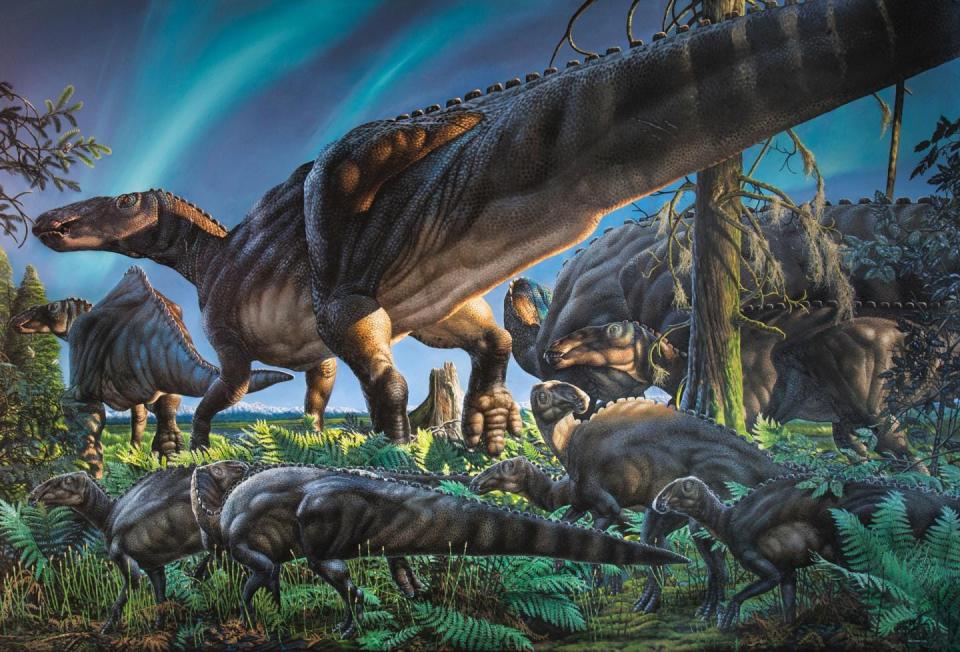The dinosaurs may have already been going extinct before the cataclysmic space rock hit Earth, new findings suggest

A 6-mile-wide space rock struck Earth 66 million years ago, dooming the dinosaurs.
But some dinosaurs had already started to go extinct before the impact, research suggests.
A era of global cooling that started 76 million years ago may have prompted that decline.
It's tempting to ponder what life on Earth might have looked like had a space rock not hit 66 million years ago. That impact in present-day Mexico doomed the dinosaurs and a majority of land and marine species. In its absence, would humans and other mammals have eventually duked it out with T. rex and triceratops?
The answer is probably not, according to a study published Tuesday.
That research found that six major groups of dinosaurs were slowly going extinct over the 10 million years prior to the crash. The impact's consequences - mile-high tsunamis, raging fires, and a choking cloud of thick dust and sulfur that blotted out the sun - were merely a nail in the dinosaurs' coffin.
"The meteorite is seen as a coup de grâce for dinosaurs, which finished them off," Fabien Condamine, a research scientist at the University of Montpellier in France who co-authored the new study, told Insider.
Condamine and his collaborators suggest that a period of global cooling may have contributed to a decline in the overall number of dinosaur species, which then made it impossible for the animals to recover after the cataclysmic event.
"Many paleontologists think dinosaurs would have continued to live if the asteroid did not hit Earth. Our study brings new information for this question, and it seems that dinosaurs were not in good shape before the impact," Condamine said.
Dinosaurs were already on their way out

The researchers behind the new study looked at 1,600 fossils from 247 dinosaur species that lived during the late Cretaceous period - from about 100 million to 66 million years ago. That group includes two-legged carnivores like the T. rex, triceratops, and duck-billed dinosaurs.
The team grouped them into six large families, then analyzed how the diversity of species in those families changed over time. The results show that across all six groups, the number of species started to gradually decline 76 million years ago, prior to the space-rock impact.
"We do not find that dinosaur diversity was high and diversifying toward the end of the Cretaceous, as previously thought," Condamine said.
His isn't the first group of scientists to suggest that dinosaurs actually went extinct gradually. A 2016 study found that as species of dinosaurs that had been around on Earth a while went extinct, no newer species replaced them. Although questions lingered as to whether that conclusion was simply the product of an incomplete fossil record, this new study shows that older species did indeed have higher extinction rates than younger ones.
An herbivore monopoly

In the late Cretaceous period, the planet began to cool: Starting 80 million years ago, global temperatures dropped by about 13 degrees Fahrenheit (7 degrees Celsius).
Given that dinosaurs relied on the temperature of their environment to regulate their body heat, Condamine said, that change in climate might have played a role in their extinction rates.
"Warm periods favored dinosaur diversification whereas cooler periods led to enhanced extinctions," the study authors wrote.
Another possible explanation for the dinosaurs' decline is a change in the number of herbivore species in the ecosystem. Hadrosaurs, or duck-billed herbivores, seem to have dominated between 76 million and 66 million years ago - out-competing their fellow leaf-eaters like triceratops and the clubbed-tailed, armored ankylosaurs. That contributed to the decline of those other herbivores.
"Removing herbivores can make the entire ecosystems more prone to extinction cascades," Condamine said.
Read the original article on Business Insider

